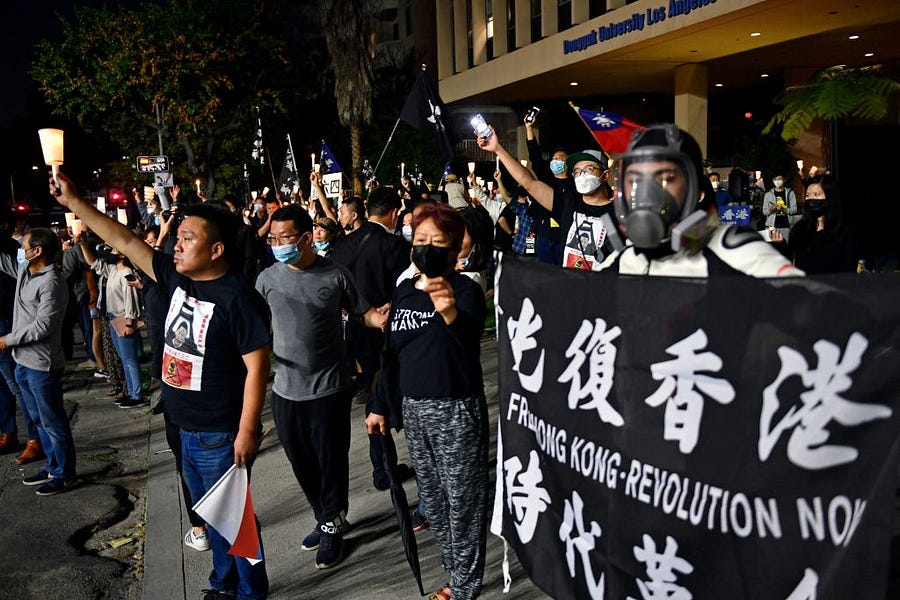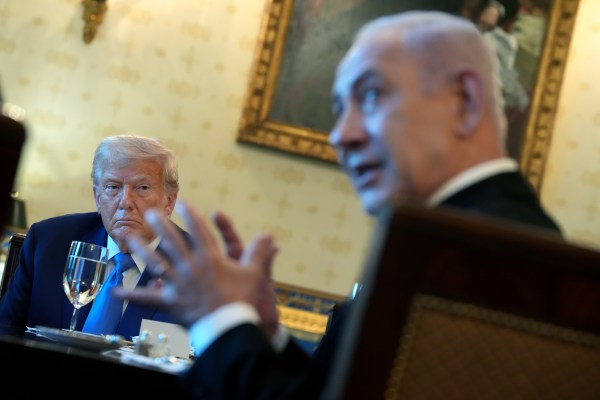On June 4, 2005, the 16th anniversary of the 1989 massacre of democracy protesters by China’s People’s Liberation Army troops, the filmmaker Liu Wei walked up to people in Beijing and asked what day it was. He captured their uncomfortable responses in a 13-minute documentary. “I know, but I don’t want to talk about it.” “I don’t know much about it.” “Don’t record this.”
That fear and ignorance are exactly what China plans to create in Hong Kong, by banning—for the second straight year—the vigil that had been held for 30 years, imprisoning those who defied last year’s ban, and shutting down a museum dedicated to June 4. Hong Kongers responded with bravery and imagination. At 8 p.m., when the vigil usually began, some walked by the gate to Victoria Park and activated the light on their cell phones as if lighting a candle. Someone designed a T-shirt with a black box in a 6:4 ratio—the date of the Tiananmen Square massacre in 1989—against a white background. However, just as in mainland China, some in Hong Kong apparently fear using the number in any context: A local weather woman omitted the humidity index, 64, from her forecast.
If democracies want things to be better by June 4 next year, they will have to push back against Chinese leaders steadily and consistently, in ways that they grew unaccustomed to under an “engagement” approach that called for delinking trade relations from human rights and relied on the Internet to defeat China’s surveillance state.
Fortunately, there has been an awakening. In the U.S., China is a subject of considerable bipartisan agreement and cooperation. President Joe Biden has continued and expanded some Trump administration policies, including a ban on U.S. investment in military companies. Europe, too, is now alert to China’s predatory economic tactics and its efforts to sow dissension among the democracies of the European Union. Italy has changed its position dramatically from just two years ago when it enthusiastically joined China’s Belt and Road investment and infrastructure initiative.
A true test of how much things have changed will come with the democracies’ approach to two upcoming events. When Beijing hosted the 2008 Summer Olympic Games, world leaders pretended that hosting an international sporting event could transform, rather than legitimize, the Communist dictatorship. President George W. Bush and other democratic leaders attended the games despite evictions and expropriation of property, lockdowns of dissidents and curbs on journalists, frittering away moral and political capital in the process. This year, no one would claim that the 2022 Winter Olympic Games in Beijing will do anything but legitimize and boost General Secretary Xi Jinping and the Communist Party dictatorship.
There is another parallel to consider as well. In 2010, the Chinese writer and democracy activist Liu Xiaobo was awarded the Nobel Peace Prize while serving an 11-year sentence for “subversion.” Liu was the most prominent signer of Charter 08, a democratic vision for China based on the rule of law, democracy, and human rights. The Nobel ceremony, with an empty chair symbolically set aside for Liu, was profoundly moving. However, China retaliated economically and diplomatically against Norway until its prime minister felt forced to make concessions to get back on good terms with Beijing. Liu died of cancer in custody in 2017 at age 61, with pleas to allow him to leave China for treatment denied.
Today, China is using subversion charges to crush Hong Kong’s democracy movement. Dozens, including Lester Shum, Wu Chi-wai, and Joshua Wong—too many to list here—are due to stand trial under the National Security Law Beijing imposed last June, merely for organizing an informal primary among pro-democracy candidates. Jimmy Lai, the founder of the popular Apple Daily newspaper, who is already serving jail terms for peaceful protests, also faces trial on subversion charges.
Members of Congress have nominated Hong Kong’s democracy movement for the Nobel Peace Prize. Of course, the Norwegian Nobel Committee chooses the laureate and there are many worthy nominees. But the committee’s members should be assured that this time, Oslo would not face Chinese retaliation alone. The G7, which will meet this weekend in Cornwall, could announce plans for unity in the face of Chinese economic pressure as part of a “robust and coordinated” response to the ongoing crisis in Hong Kong that six former U.K. foreign secretaries have asked Prime Minister Boris Johnson to lead. The idea, put forward by Jonas Parello-Plesner, is modeled after the North Atlantic Treaty Organization’s collective defense guarantee. Once such a measure is adopted, Norway, or Australia, which is currently in China’s sights, will know that it can resist Chinese economic pressure “aided by the combined trade power of the world’s democracies which make up more than half of the world’s economic might.”
And then what? The contest between free and repressive regimes is the struggle of our times, and there will be many more battles. Hungarian Prime Minister Viktor Orbán serves as China’s proxy in the European Union, blocking a statement of support for Hong Kong and a proposal to assist Hong Kongers who wish to come to work or study in the EU while the crackdown in their home city intensifies. Many Hungarians citizens don’t care for Orbán’s coziness with China. Thousands have protested against the plan to build a Chinese university in Budapest that involves taking on massive debt, for a project using exclusively Chinese labor and construction materials, on land that had been intended for dormitories for low-income Hungarian students studying in the capital. Budapest’s mayor, Gergely Karácsony, has renamed roads to honor the Dalai Lama, the Hong Kong democracy movement, and the victims of China’s genocide against the Uighurs.
This isn’t just political theater, but a rebuke to Orbán and Chinese government influence that should be applauded.
What will Hong Kong be like when June 4 comes around next year? And what will the world’s leaders be able to say they did in defense of democracy and human rights there, and anywhere China is advancing its anti-democracy agenda?
Ellen Bork is president of the Committee for Freedom in Hong Kong and a contributing editor at American Purpose.






Please note that we at The Dispatch hold ourselves, our work, and our commenters to a higher standard than other places on the internet. We welcome comments that foster genuine debate or discussion—including comments critical of us or our work—but responses that include ad hominem attacks on fellow Dispatch members or are intended to stoke fear and anger may be moderated.
With your membership, you only have the ability to comment on The Morning Dispatch articles. Consider upgrading to join the conversation everywhere.